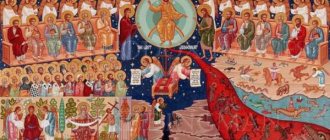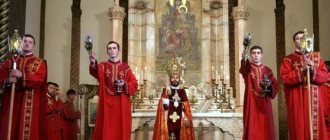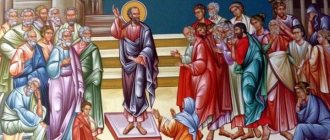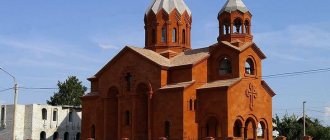Angel's Day and name days are holidays that are heard by everyone, but very few people today celebrate them properly. In the popular consciousness, name days have long been identified with birthdays. We call a “birthday boy” someone who celebrates growing up for another year. Children have fun playing the famous game “Loaf”, where they all sing: “We baked a loaf for our name day.” Believers, of course, remember when they and their relatives have an Angel Day, but often limit themselves to only verbal congratulations. Whereas 150 years ago in Russia, celebrations of these dates were surrounded by many traditions, preserved today only in folklore heritage.
What are name days
To understand what a name day is, you first need to understand how exactly children were given a baptismal name. Theoretically, parents had a choice of what to name their child from three dates at once:
- birthday itself;
- according to tradition, that is, to give a name on the eighth day after birth;
- the fortieth day from birth (when the child was brought to the temple and baptized).
In practice, the baby was usually named according to which holy righteous person patronized the day of his baptism. They baptized their son, for example, on the day of Basil the Great - and they called him Vasily. It was believed that this was what pleased the Lord, and this day was the spiritual birth of a new Orthodox person.
Name day is the day when a person was baptized and a spiritual patron saint was assigned to him. They were revered in Rus', celebrated with great attention and respect, but there was no tradition of celebrating the day of birth.
Namesake of clergy
The name day for clergy is the date of acquisition of rank or church name. Ordinary church ministers conduct a solemn service in honor of their heavenly patron locally. But the highest ranks (metropolitans or patriarchs) perform the liturgy in the main church of the city.
It is also customary for clergy to give gifts for their namesake. All of them must have an ecclesiastical meaning. It could be:
- Orthodox literature;
- holy images;
- utensils for performing the sacraments;
- fabrics for vestments
Since ancient times, a person's name has been of great importance in his life. Given at birth, it leaves an imprint on the rest of your life. That is why you need to approach the choice consciously and give the child the right name.
If you find an error, please select a piece of text and press Ctrl+Enter.
Day Angel
What is Angel Day? Although this concept itself is not new, its meaning has undergone some changes over the years. In order to understand the issue, you need to understand the concept of a patron saint.
It was believed that the righteous person on whose day a person was born would accompany him throughout his life, guiding him in difficult moments and protecting him from troubles. Natural transformations over the course of centuries also befell this concept, as a result of which the patron saint began to be identified in the popular consciousness with a guardian angel. However, the Orthodox Church has a different view on this issue. It is canonically believed that a guardian angel is a spiritual mentor invisible to people, serving the forces of good, whom God assigns to each person at birth. At the same time, we cannot know the name of our personal guardian; accordingly, they are different personalities with the patron saint.
In modern times, this concept is undergoing changes again. Children are no longer named according to the church calendar, but according to their own wishes. Often the child's name does not coincide with the patron saint of his birthday or baptism, since it was chosen completely haphazardly. Few modern people born in the last three decades know the specific date when he was baptized. If earlier name day and Angel's day were synonymous terms, today the memory of the latter can be celebrated on a completely unpredictable date. After all, not all Tatyanas were born on January 25, and not all girls born on this date are given the name Tatyana.
So today is Angel Day - this is the date on which the Church remembers your patron saint. However, it does not necessarily coincide with name days. Moreover, this holiday may not be the only one a year! Many saints, in addition to personal memorial dates, also have cathedral ones. For example, men named after Sergius of Radonezh can celebrate the day of the Angel on October 8 (repose), July 18 (discovery of relics) and July 6 (Cathedral of the Vladimir Saints).
Why do you need to know your patron saint?
Every Christian should study the life of his patron saint in order to be a worthy bearer of the name given at baptism. We should remember the saint in whose honor we receive a name not only on name day. The daily morning and evening prayer rule includes a prayer to the saint, and we can also turn to him at any time and in any need. The simplest prayer to the saint:
It is also necessary to have an icon of your heavenly patron in your home iconostasis. It may happen that a person has a rare name, and it is difficult for him to find an icon of his saint. In this case, you can purchase an icon of All Saints, which symbolically depicts all the saints glorified by the Orthodox Church.
Our saints are able to inspire us by their example to patiently follow our path in life. After all, the patron saint is a person just like us, only he managed to overcome all the difficult trials of his earthly life without complaint and dignity. Saints are like bright guiding stars, helping to find the way to the Kingdom of Heaven.
By providing a worthy example of earthly life, the saints help their wards take the path of salvation. We should know their exploits in order to learn to imitate them worthily. For a layman, imitation of a saint is not a departure from the whole world, but in any case it is a feat of self-sacrifice. We should seek spiritual blessings instead of being attached to earthly ones. We must also obey the authorities and laws. Our task is to profess Christian beliefs and live according to divine laws. For this purpose, we must study the lives of the saints in order to be imbued with their inspiring example. And then apply the acquired knowledge to your worldly life.
Having delved into the lives of the saints, one can clearly see their high spiritual perfections: humility, selflessness, fortitude, non-covetousness. These are the qualities that all of us should imitate in our earthly lives. Remember that the saints spoke the truth to those who needed it without any fear. And how steadfastly they endured all the hardships, frost and heat, thirst and lack of food.
Our task is to eradicate in ourselves such vices as self-love, selfishness and pride, and instead of them learn patience and uncomplainingly bearing insults. Whoever can cultivate these important qualities in himself will become worthy of bearing the name of the heavenly patron
We will come at least a little closer to the deeds that our saints performed, and we will become worthy of the sacred names that were given to us at the sacrament of Baptism. Therefore, it is necessary and important to know your patron in order to follow his example and live a worthy earthly life!
Difference between name day and Angel's day
After carefully analyzing the question, it is easy to figure out the difference between these two concepts. For a long time they were identical. Moreover, for a Russian person living three centuries before us, “angel” was associated with a guardian angel and the cathedral holiday of “heavenly ethereal forces,” and the patron saint was a separate person.
But today everything is different. The meaning of the concepts is confused. We congratulate a person on his name day on the day of his physical birth, i.e., birth. A name day is called any date in memory of the patron saint. In the historical and traditionalist context, name day is the day of baptism of a child, when he is given a holy name with which he will appear before God.
Today it is appropriate to talk about the name days of those people who were named not haphazardly, but in accordance with the Saints, or those whose personal and baptismal names differ (for example, Dina, because according to the Saints her patroness will be Evdokia). The same people whose names do not coincide with the date of christening celebrate the day of the Angel (their patron). This date may be several months behind a specific event (the birth of a child).
In practice, these concepts remain synonymous, and few people understand their difference.
The meaning of the name in Christianity
The Christian Church attaches great importance to the choice of a person’s name, seeing in this a special meaning and sacredness. It is believed that the name is the key and bridge through which a person communicates with God. When performing the sacrament of baptism, the Orthodox Church gives a person a name that will become a guide in contact with God.
In past times, every Christian name was considered holy and required respect. The Church Fathers teach: the universe was created in name and word, and it is maintained by them.
The commonality of Orthodox names unites all believers into one whole - God's chosen people.
Naming a baby after a saint meant guiding him on the true and pious path. This was due to the belief that the name of a canonized saint, which was realized in a blessed path, would lead a new person to holiness. It is believed that with the power of his name the saint fills his fellow-name with grace. That is, it has a formative beginning.
The Orthodox name book has evolved over centuries. The meaning of the name in the Orthodox tradition is so strong that even the iconographic face must be confirmed by the holy name. Therefore, the names of the saints and angels depicted are always written on icons.
Since ancient times, in Rus' there has been a tradition of naming several names, so the baptismal name was taken for granted. In past times, a person could have a name from birth, a nickname and two baptismal names - one for everyone, and the second was known only to the clergy.
However, nicknames did not sink into oblivion, but organically turned into surnames. This can be judged by modern surnames - Naydenov, Nekrasov, Zhdanov. These are all former nicknames of a person. In Orthodoxy, some pre-Christian names were also preserved and even canonized - Vladimir, Yaroslav, Vsevolod, Svyatoslav.
With the adoption of Christianity, the name book was enriched with the names of other peoples - Jewish, Greek, Byzantine, Roman. For example, the common Russian names Marya and Ivan actually have Jewish roots. The church fathers believe that there is no need to separate names by nationality, since they are a universal property.
How to celebrate name days in Rus'
The traditions of celebrating name days combined both everyday rituals and church ones. A visit to the temple was mandatory. From the very morning, the birthday boy went to church to pray to the saint who guarded him and receive communion. He did not go to the temple alone, but with relatives. They ordered a prayer service for health and also lit candles at the icon of the patronizing righteous man.
One of the main household traditions was the preparation of loaves. This is where the roots of the famous children's game mentioned at the beginning of the article come from. Large original-shaped pies always had fillings and were decorated on top with the name of the hero of the occasion. They were distributed or sent to relatives and friends, and they always visited the houses of their godfather and mother. The largest and most beautiful pies were prepared for them.
And in the evening, all the invited friends and relatives gathered in the house to celebrate the name day. At the head of the table there was always a large loaf stuffed with raisins. Today, this tradition has resulted in the custom of placing a birthday cake with candles on the table. The pie was broken over the birthday boy's head, showering him with raisins. The guests said: “So that gold can fall on you like that.” This is exactly how they wished for a person to have prosperity in his family.
Birthday
The tradition of marking the date of physical birth arose during the Soviet era. It was an attempt by the authorities to make people forget about Christian customs. A loaf stuffed with raisins transformed into a birthday cake. The birthdays of statesmen began to be celebrated on a national scale (exactly as the name days of sovereigns were celebrated in Tsarist Russia). Gradually, this artificial substitution of concepts has become the reason that today many people confuse birthdays with name days, and do not know how to celebrate them correctly.
But fortunately, there is a tendency to revive Russian customs, and the celebration of name days is becoming increasingly popular among Orthodox people.
The Fall of the First People
Why do parishioners have such doubts? In one of David’s psalms there are the following lines: “Behold, I was conceived in iniquity, and my mother gave birth to me in sins” (Ps. 50:7). The Greek theologian Euthymius Zigaben argued that in this song David says that he was conceived in sin and was born in sin. According to Euthymius, humanity owes this state of affairs to Adam and Eve. “For if Adam had not sinned, then there would have been no need for him to have carnal intercourse with Eve,” writes the theologian. So is it necessary to celebrate such a sinful event as birth?










